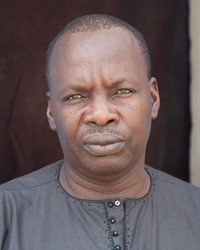Gaahmg in Sudan

Photo Source:
Humanitarian Response
Creative Commons
|
Send Joshua Project a map of this people group.
|
| People Name: | Gaahmg |
| Country: | Sudan |
| 10/40 Window: | Yes |
| Population: | 132,000 |
| World Population: | 132,000 |
| Primary Language: | Gaam |
| Primary Religion: | Islam |
| Christian Adherents: | 0.50 % |
| Evangelicals: | 0.10 % |
| Scripture: | Translation Started |
| Ministry Resources: | No |
| Jesus Film: | No |
| Audio Recordings: | No |
| People Cluster: | Nilotic |
| Affinity Bloc: | Sub-Saharan Peoples |
| Progress Level: |
|
Introduction / History
The Gaahmg live in the Tabi Hills of Sudan, near the Ethiopian border. They, along with the other groups in this region, are bordered on all sides by powerful, dominating peoples. Although this region is home to different political, cultural, and linguistic traditions, the Gaahmg have successfully avoided assimilation. Aided by the terrain of the Tabi Hills, which are isolated and rocky, the Gaahmg have never been conquered and have succeeded in keeping their language pure.
The Gaahmg are infamous for their hostility toward strangers. In the past, refugees have refused to go there due to their hostile reputation. Because of their isolation, the Gaahmg have become a very cohesive group and have been influenced very little by outsiders. This lack of openness to outside influences partially explains why they are so resistant to the gospel.
What Are Their Lives Like?
The Gaahmg rely equally on their crops and their herds for survival. They keep their herds of pigs, cattle, sheep and goats on grazing grounds about three hours away from the villages. Millet is their staple crop, and they can grow two crops a year: one on the slopes of the hills adjoining the houses, and again in clearings on the plains. If necessary, they grow sesame to compensate for a poor sorghum harvest. Gaahmg homes are the most strongly constructed and elaborate in the Southern Fung region.
Traditionally, children are cared for by their parents until they reach adolescence. Generally, the women and young children do not live with the rest of the family. Instead, they live in homes of their own until the children reach puberty. Most girls are betrothed while very young and marry during adolescence. When boys reach puberty, they either begin herding their fathers' cattle in the temporary camps on the plains or move in with a maternal uncle or other relative.
Young couples do not live together when they first get married. The husband either lives with his father or his father-in-law, and the wife continues living with her mother and sisters. Later, when the young couple has children of their own, they move to separate dwellings.
The Tabi Hills region is divided into many sections. Each section has its own grazing ground, hunting areas, and farmland. A chief serves as the religious and political head of each section. He usually lives in a separate hut called the hut of the sun, which is also the center of religious life for the people. A number of sections form one tribe, and each tribe is led by a "hereditary war leader."
What Are Their Beliefs?
Though the Gaahmg are mostly Muslim, there are a lot of pre-Islamic beliefs mixed in. They worship the sun. They believe that the sun, or Tel, is the creator of life and of the universe. They call upon Tel during important crises, such as when drought threatens, when a child is sick, or when a woman is barren. Shrines for Tel are in each village and worshipped regularly.
When a Gaahmg dies, he is buried wherever he was lying. That is why a man who is extremely ill will try to reach his own village and a woman will leave her husband and go to the house of her father. If a person dies outside his village, his family performs a ceremony to call his spirit back to their village. The deceased are then washed, ornately decorated, and completely covered in cloth. The body is placed on a mat, with the head facing east. After the burial ceremony, the Gaahmg people place stones around the grave.
The Gaahmg believe that dreams are very important for understanding reality. They are especially attentive to the dreams of certain influential individuals they call doctor-diviners. Such individuals can communicate with the spirit world in their sleep and gain insight and guidance as to what the spirits want.
What Are Their Needs?
There is a great need for Christian literature to be translated into their language. Laborers are also needed to work among these tribes, showing them the love of Jesus in practical ways. Prayer is the key to seeing these hostile people reached with the gospel.
Prayer Points
Pray for the Lord to give dreams and visions to Gaahmg religious leaders, drawing them to the King of kings.
Pray for their leaders to open the door for Christ to bless their families and communities.
Pray for the Lord to bless the Gaahmg in practical ways and that they will understand that he loves them and wants them to become part of his family.
Pray for the Lord to thrust out workers into the Gaahmg harvest.